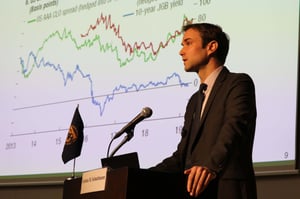NEWS from Asia and the Pacific
Key Takeaways of IMF Flagship Reports Introduced to Japan-based Audience
April 24, 2019, Tokyo - The IMF Regional Office for Asia and the Pacific hosted an Economic Issues Seminar in Tokyo on April 24, 2019, providing an opportunity to share two recently published flagship reports of the IMF with an audience based in Japan. The seminar brought together more than a hundred participants from government institutions, financial institutions, private sector, media, academia and international organizations.
The seminar is part of the regional office’s outreach efforts to disseminate IMF’s knowledge to a wider audience.
 Resident Representative to Singapore Jochen Schmittmann first presented an
overview of the IMF’s latest
Global Financial Stability Report
(GFSR). He said that after sharp declines in the fourth quarter of 2018,
financial markets rebounded strongly in early 2019 on growing optimism
about US-China trade negotiations and major central banks’ more patient
approach to monetary policy normalization. This shift in advanced
economies, he said, has helped sustain positive market sentiment despite
signs of weakening global growth and corporate earnings expectations. In
addition, he said that financial vulnerabilities are elevated by historical
standards, and a sudden sharp tightening in financial conditions could
expose these vulnerabilities and raise near-term financial stability risks.
Resident Representative to Singapore Jochen Schmittmann first presented an
overview of the IMF’s latest
Global Financial Stability Report
(GFSR). He said that after sharp declines in the fourth quarter of 2018,
financial markets rebounded strongly in early 2019 on growing optimism
about US-China trade negotiations and major central banks’ more patient
approach to monetary policy normalization. This shift in advanced
economies, he said, has helped sustain positive market sentiment despite
signs of weakening global growth and corporate earnings expectations. In
addition, he said that financial vulnerabilities are elevated by historical
standards, and a sudden sharp tightening in financial conditions could
expose these vulnerabilities and raise near-term financial stability risks.
Looking ahead, Mr. Schmittmann noted that the GFSR recommends well-communicated monetary policies and the use of macroprudential measures where financial vulnerabilities are building.
 Ms. Wenjie Chen, Economist in the Research Department of the IMF, then
summarized the
World Economic Outlook
(WEO). She said that the global economic expansion decelerated in the
second half of 2018, following strong growth in the last two years,
reflecting a confluence of factors affecting major economies such as
US-China trade tensions. Global growth is now projected to slow from 3.6
percent in 2018 to 3.3 percent in 2019, before returning to 3.6 percent in
2020, she said. With many downside risks—such as uncertainty over trade
policies, slowing growth in China and Brexit—the imperative is for all
economies to take actions to boost potential output, improve inclusiveness,
and strengthen resilience.
Ms. Wenjie Chen, Economist in the Research Department of the IMF, then
summarized the
World Economic Outlook
(WEO). She said that the global economic expansion decelerated in the
second half of 2018, following strong growth in the last two years,
reflecting a confluence of factors affecting major economies such as
US-China trade tensions. Global growth is now projected to slow from 3.6
percent in 2018 to 3.3 percent in 2019, before returning to 3.6 percent in
2020, she said. With many downside risks—such as uncertainty over trade
policies, slowing growth in China and Brexit—the imperative is for all
economies to take actions to boost potential output, improve inclusiveness,
and strengthen resilience.
Ms. Chen, a co-author of Chapter 2 of the WEO, also shared her study on the impact of corporate market power. Although the macroeconomic implications have been modest so far, she said that a further increase in market power could have negative implications in the future, such as weaker investment.
Both sessions were followed by Q&A and general discussions. Some participants shared their concerns about rising sovereign debt, especially in emerging markets. Others, referring to Chapter 2 of the WEO, asked about the linkages between increasing market power of firms and rising inequality, and noted that they welcomed the IMF’s attention to this topic.
Photo: Resident Representative to Singapore Jochen Schmittmann presents key points of the latest Global Financial Stability Report while Research Department’s Economist Wenjie Chen introduces an overview of the latest World Economic Outlook.


